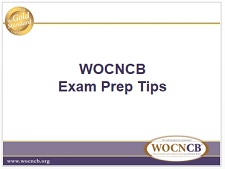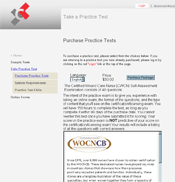Exam Tips
There are 120 questions on each specialty exam. One hundred twenty minutes are allowed to complete each specialty exam. You may skip questions and go back and answer them later or change answers. You will be notified about your results before you leave the assessment center. Use time wisely and thoroughly read each question.
- Be sure to schedule and take your exam within 12 months of application approval.
- Select an appropriate test center that meets geographical needs.
- Systematically review content. Be sure to understand the "whys" of nursing actions.
- Carefully review the content outline in the handbook for each exam you wish to take. This provides the foundation for content that will be presented on the exam.
- Relate pathophysiology to nursing care. In order to select the best nursing action, you will need to know the related pathophysiology.
- Practice answering questions. Questions are found at the end of each chapter of most textbooks.
- To help build confidence and reduce anxiety, attend a review course, or order the Self-Assessment Exam.
- The most important skill for the test taker is the ability to read the question carefully and determine the key elements in the question.
- All questions are multiple choice with only one correct answer. There are no questions for which there may be multiple answers and no true-false questions. There is only one correct answer for each question.
- In reviewing each question learn how to analyze the question. Each question contains parts:
- The case (sometimes called the scenario) - the description of the client and what is happening to him/her.
- The stem - the part of the question that asks the question.
- The correct response or best answer
- Distracters - incorrect but feasible or not the best answers.
- Each question has key words that relate to the client, to the problem and to specific aspects of the problem.
- As you read the answers to the question start eliminating choices. Remember if you make a wild guess you have a 25% chance of getting the answer correct. If you narrow the choices to two you have a 50% chance!
- If more than one answer seems correct, go back and read the stem again CAREFULLY! Look for key words to tell you the answer.
- Factors about the client are very important. Such factors include: age, sex and health care setting.
- Whenever a specific time frame is indicated it is very important. Words such as early, late or pre-operative or post-operative influence nursing interventions.
- If none of the answers seem to be appropriate, reread the stem and select the best answer from those offered.
- There is anxiety surrounding the exam. Some anxiety is to be expected and may be desirable as it helps to motivate the clients to study for the exam.
However, sometimes anxiety gets to be too high and interferes with the ability to think.- Mild anxiety increases focusing and concentrating ability. This level is okay and does not interfere with test taking.
- Moderate anxiety produces somatic symptoms such as butterflies and muscle tension. This level is functional and can help alertness.
- Severe anxiety interferes with the ability to function on the exam. Somatic symptoms increase; such as, dry mouth, diarrhea, nausea and/or diaphoreses. It becomes difficult to see connections between details and interferes with concentration. This level should be avoided during the exam if at all possible.
- At the panic level, hyperventilation may occur with a feeling of dread or terror. Logical thinking is impaired.
Relaxation techniques help to relieve anxiety during the exam. Practice relaxation exercises daily prior to the exam so that they can be applied during the exam if feeling severe anxiety or panic. - In final preparation:
- Bring proper identification to the test center.
- No alcohol, sedative, etc., the day of the exam or the night before.
- Relax the night before the exam.
- Locate the building and practice the route if you are driving.
- Locate parking.
- Eat breakfast.
- When drinking liquids, remember the "bladder factor". Time spent in a rest room is not deducted from the maximum time allowed for the exam.
- Leave books at home on the day of the exam.
- Dress in comfortable layers. The test center may be too hot or too cool.
- Use relaxation techniques during the exam if necessary.






